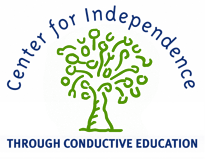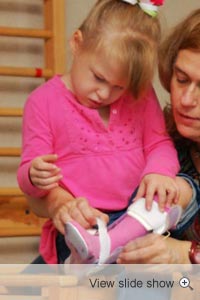School Year Programs
Mother/Father and Toddler Group
(0 to 3 years)
2 mornings per week; 2.5 hours each day
This program provides a safe and stimulating environment and recognizes that infants and toddlers are ready to investigate their world and explore their own creativity. The focus is on developing motor function, building self–esteem, and creating feelings of independence. Routines are taught to parents to be incorporated into everyday life.
Preschool Group
(3 to 5 years)
3 mornings per week; 2.5 hours each day
This program focuses on activity–based learning, planned around the child’s growing need for learning while doing. Emphasis is on developing early foundations in cognitive and motor skills while enhancing motivation, self–esteem, problem solving strategies and optimal functional independence.
School Age Groups
(6-10 years and 11–18 years)
5 afternoons per week; 3 hours each day on a 4 week on, 4 week off rotation
The program recognizes this very important time in a child’s development. The focus is on preparing the children for life and the many challenges ahead. Functional daily life skills are emphasized through active, involved learning.
The Center works in cooperation with local school districts, filling a huge void in a strictly academic public–school setting, where activities of daily life skills cannot possibly be addressed intensively in a mainstream setting. The Center believes that children with physical disabilities deserve to be educated in both academic and life skills — one without the other does not develop the whole child. Children with physical disabilities are complex and deserve a complex education.
Adult Stroke Group
1 evening per week; 2.5 hours each day in 8 Week Sessions
Dedicated to helping adults post-stroke, this group focuses on facilitating functional motor skill acquisition while empowering individuals through the use of the social context. The integrated complex programs help individuals relearn skills lost due to stroke, while also focusing on teaching new movement strategies to address residual disabilities. Sessions are dedicated to improving balance, coordination, and ambulation skills, in addition to working on improving fine motor skills, endurance, and self-help skills.

